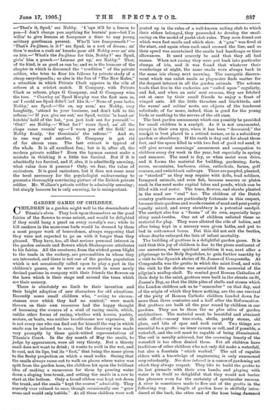GARDEN GAMES OF CHILDREN.
CHILDREN in a garden might well be the descendants of Titania's elves. They look upon themselves as the good fairies of the flowers to some extent, and would he delighted if they could hang a pearl on every cowslip's ear; while to kill cankers. in the moss-rose buds would be deemed by them a most proper work of benevolence, always supposing that they were not expected to go on with it longer than they pleased. They have, too, all that serious personal interest in the garden animals and flowers which Shakespeare attributes to his fairies. All the creatures, from the wicked green blight to the toads in the rockery, are personalities in whom they are interested, and there is not one of the garden population which is not occasionally called. upon to play a part in the children's games, or to serve as a recruit in some newly devised pastime in company with their friends the flowers on the lawn which is their stage and around the trees which are their scenery.
There is absolutely no limit to their invention and their bright adoption of new characters for old situations. Recently some small children who, " owing to circum- stances . over which they had no control," were much thrown on their own resources bad the happy thought of becoming the owners of a stud of racing snails, which, unlike other forms of racing, whether with horses, yachts, motors, or boats, was neither troublesome nor expensive. It is not every one who can find out for himself the way in which snails can be induced to race; but the discovery was made very promptly by these quick-witted representatives of Titania's Court. In the dry month of May the snails, to judge by appearances, were all very thirsty. But a thirsty snail does not want to drink; it wants to walk in the wet, and to cool, not its lips, but its "foot," that being the name given to the fleshy projection on which a snail walks. Seeing that the snails always came out to walk on places where water was spilt from the garden hose, the children hit upon the brilliant idea , of making a racecourse for them by pouring water down a sloping tree-trunk, and setting the snails in a row to start at the bottom. Only ,a, broad ribbon was kept wet down the trunk, and the snails "kept the course" admirably. They scarcely ever refused :to race, thqugh, occasionally one "grew cross and would only bubble." As all these children were well
posted up in the rules of a well-known sailing club to which their elders belonged, they proceeded to develop the snail- racing on the model of yacht club rules. They soon found out which were fast snails and which slow. A "gun" was fired at the start, and again when each snail crossed the line, and as their speed was ascertained the snails had handicaps or time allowances. It need scarcely be said that they all had names. When not racing they were put back into particular clumps of iris, and it was found that whatever their wanderings at night, the same snails were always back in the same iris clump next morning. The energetic discern- ment which can enlist snails as playmates finds matter for the deepest interest in all the garden animals. The solemn toads that live in the rockeries are "called upon" regularly, and fed, and when an ants' nest swarms, they are fetched out at once by their small friends to enjoy a feast of winged ants. All the little thrushes and blackbirds, and the wrens' and robins' nests, are objects of the tenderest solicitude, of far more, indeed, than is good for the young birds or soothing to the nerves of the old ones.
The best garden amusement which can possibly be provided for small children is a sandpit. As it is not ornamental, except in their own eyes, when it has been " decorated," the sandpit is best placed in a retired corner, or in a subsidiary garden or shrubbery. If the earth is dug out for about three feet, and the space filled in with two feet of good red sand, it will give several mornings'_ amusement and occupation to children every dry week in the year, but especially in spring and summer. The sand is dry, or when moist soon dries, and it forms the material for building, gardening, forts, caves, mountains, harbours, cities, cathedrals, farms, golf courses, and switchback railways. These are peopled, planted, or "stocked" as they may require with dolls, lead soldiers, farmyard animals, and even fish, because saucers or plate's sunk in the sand make .capital lakes and ponds, which can be filled with real water. The trees, flowers, and shrubs planted in the sand are " real " too. The children of the Dutch country gentlemen are particularly fortunate in this respect, because their gardens and woods consist of sand and peat pretty equally mixed, and every shrubbery is a potential sandpit. The sandpit also has a " fauna " of its own, especially large shiny sand-beetles. One set of children enlisted these as material for play. They were allotted the role of babies, and after being kept in a nursery were given baths, and put to bed in cottonwool boxes. But this did not suit the beetles, whose deaths enlarged the lists of infant mortality.
The building of grottoes is a delightful garden game. It is said that this joy of children is due to the pious sentiment of our ancestors, whose spiritual ambition it was, next after a pilgrimage to the Holy Sepulchre, to gain further sanctity by a visit to the Spanish shrine of St. James of Compostella. At Compostella was the grotto in which the saint lived, and with the visit to the shrine was associated the memorial of the pilgrim's scallop-shell. To remind good Roman Catholics of their duty to the saint, grottoes were built in the streets on St. James's Day, so that the little piles of shells and stones which the London children ask us to " remember " on that day, and of the origin of which they know nothing, are the one survival of the piety of Roman Catholic children handed down for more than three centuries and a half after the Reformation. But grottoes are built all the year round by children in our gardens. They are to them the ne plus ultra of garden architecture. The material must be beautiful and obtained with offort,—mossy tree-roots, shells, pretty stones, old glass, and bits of spar and rock coral. Two things are essential to,a grotto: an inner cavern or cell, and if possible, .a waterfall, and the cell must be capable of being illuminated. The cell is .usually achieved, but the crowning beauty of the waterfall is too often denied them. Yet all children have traditions of other children who not only did make a waterfall, but also a fountain " which worked." The aid of capable elders with a knowledge of engineering is only summoned very reluctantly. Nee deus inter•st is a canon of gardening art which they always respect. They like to build the grotto to its last pinnacle with their. own hands, and playing with water is in itself so delightful that they would not barter the pleasure even for the certainty of spectacular success. A river is sometimes made to flow out of the grotto in the following way. A length of garden hose is skilfully intro- duced at the back, the other end of the hose being "fastened
to the bottom of a flower-pot full of water, the flower-pot being sunk in a mound and the hole corked. The company are then invited to see the grotto, and all are requested to shut their eyes. The cork is then removed, and the water trickles down the pipe and into and out of the grotto. Then the word " Ready !" is given, and every one is at liberty to open his eyes, and enjoy the admirable spectacle as long as it lasts.
Flower games are mainly the occupation of their quiet moments, yet daisy-chains and cowslip-halls keep them sedulously employed when the fancy takes them. Divination by /lowers and plants also plays a part in their hours of garden ease. The dandelion-seeds blown at with their little pouting lips name the hour of the day or the day of the week on which some unknown treat will be theirs, and the rye grass and meadow fescue tell them whom they will marry or what they will be, what they will ride in, how they will be housed, and what they will wear. The seeds of the lawn plantains make sport as fighting cocks, and the horse chest- nuts threaded on strings afford a fortnight of challenge in the game of conquerors. " I spy " and bide-and-seek are naturally the main and standard form of active garden game, the joys of which need no description. But an added zest is given to this when bigger people play, who can be shown and taught to appreciate the excellence of all the most recently 'discovered hiding-places.







































 Previous page
Previous page